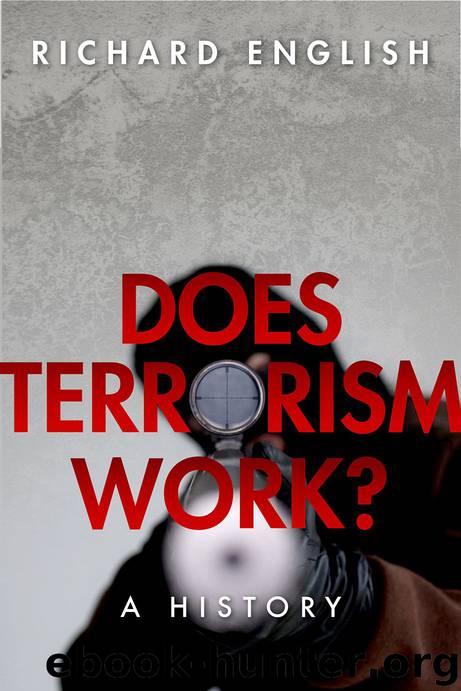Does Terrorism Work? by English Richard;

Author:English, Richard;
Language: eng
Format: epub
Publisher: Oxford University Press, Incorporated
Published: 2016-04-11T16:00:00+00:00
IV
We must calculate the benefit and cost of continued armed operations. If we can fulfil our goals without violence, we will do so. Violence is a means, not a goal.
Gaza-based Hamas leader Mahmud al-Zahar, 1995163
Despite the clandestine nature of terrorism, therefore, there exist multiple sources on which to base a systematic assessment both of what Hamas has wanted, and also of how far it has actually managed to achieve it. Hamas terrorism has not been victorious in the sense of securing the group’s central, strategic goal of an Islamic Palestinian state covering the desired territory; but their violence might be judged to have contributed to a long-term process within which Israeli determination to hold onto Gaza and the West Bank has been diluted, and from which autonomy for part of the desired territory might meaningfully emerge. They have unquestionably sustained resistance and have succeeded in inflicting revenge upon their enemies; but the costs here have been high, in terms of producing more violent suffering (rather than protection) for many Palestinians, and in terms of the deeply polarizing consequences of their terroristic endeavours. They have had some success in determining the political agenda (damaging a peace process which they despised), and they have gained some interim concessions as well as huge publicity. That publicity, however, has generated a negative impression of Palestinian politics being associated with cruel violence, and it is also true that Hamas’s operational successes have been accompanied by some tactical-operational failures over the years. They have undermined Israeli and also Palestinian opponents, and their violence has allowed them to gain and enforce control over certain populations; but that control has also grown from much of their non-violent work too. Inherent rewards have been there, but so has much torment and suffering as a result of the violent campaign.
Very long pasts indeed lie behind the conflict in which Hamas has been involved, and it would seem unlikely that such enduring enmities will result in clear victory for any combatant or in amiable resolution. Communities in such profound disagreement have here produced a blood-stained palimpsest which is not yet completed. Hamas—whose politics are so different from those of the other Islamic group to which a chapter of this book is devoted164—must still (like al-Qaida) be explained in terms of political and historical contexts and reasonable explanation. There seems nothing innately or inevitably violent about the population which produced Hamas. It is hard, for example, to square a culturally inevitable account with the evidence, given that between the 1967 Israeli seizure of the Gaza Strip and West Bank and the mid-1980s, most Palestinians in those places were not actively involved in terrorism against Israel or the IDF.165 And the early phase of the First Intifada makes clear that there is nothing necessarily violence-prone about Palestinian resistance, since the activity involved in that uprising was largely peaceful or (at most) very punily violent.166
Hamas has evolved and changed over time, and there seems to me nothing inevitably determined about people having supported it at the levels at which they have, or about Hamas using violence at particular levels.
Download
This site does not store any files on its server. We only index and link to content provided by other sites. Please contact the content providers to delete copyright contents if any and email us, we'll remove relevant links or contents immediately.
| Arms Control | Diplomacy |
| Security | Trades & Tariffs |
| Treaties | African |
| Asian | Australian & Oceanian |
| Canadian | Caribbean & Latin American |
| European | Middle Eastern |
| Russian & Former Soviet Union |
The Secret History by Donna Tartt(19088)
The Social Justice Warrior Handbook by Lisa De Pasquale(12190)
Thirteen Reasons Why by Jay Asher(8910)
This Is How You Lose Her by Junot Diaz(6887)
Weapons of Math Destruction by Cathy O'Neil(6280)
Zero to One by Peter Thiel(5802)
Beartown by Fredrik Backman(5754)
The Myth of the Strong Leader by Archie Brown(5507)
The Fire Next Time by James Baldwin(5446)
How Democracies Die by Steven Levitsky & Daniel Ziblatt(5219)
Promise Me, Dad by Joe Biden(5153)
Stone's Rules by Roger Stone(5088)
A Higher Loyalty: Truth, Lies, and Leadership by James Comey(4964)
100 Deadly Skills by Clint Emerson(4925)
Rise and Kill First by Ronen Bergman(4789)
Secrecy World by Jake Bernstein(4753)
The David Icke Guide to the Global Conspiracy (and how to end it) by David Icke(4720)
The Farm by Tom Rob Smith(4513)
The Doomsday Machine by Daniel Ellsberg(4490)
